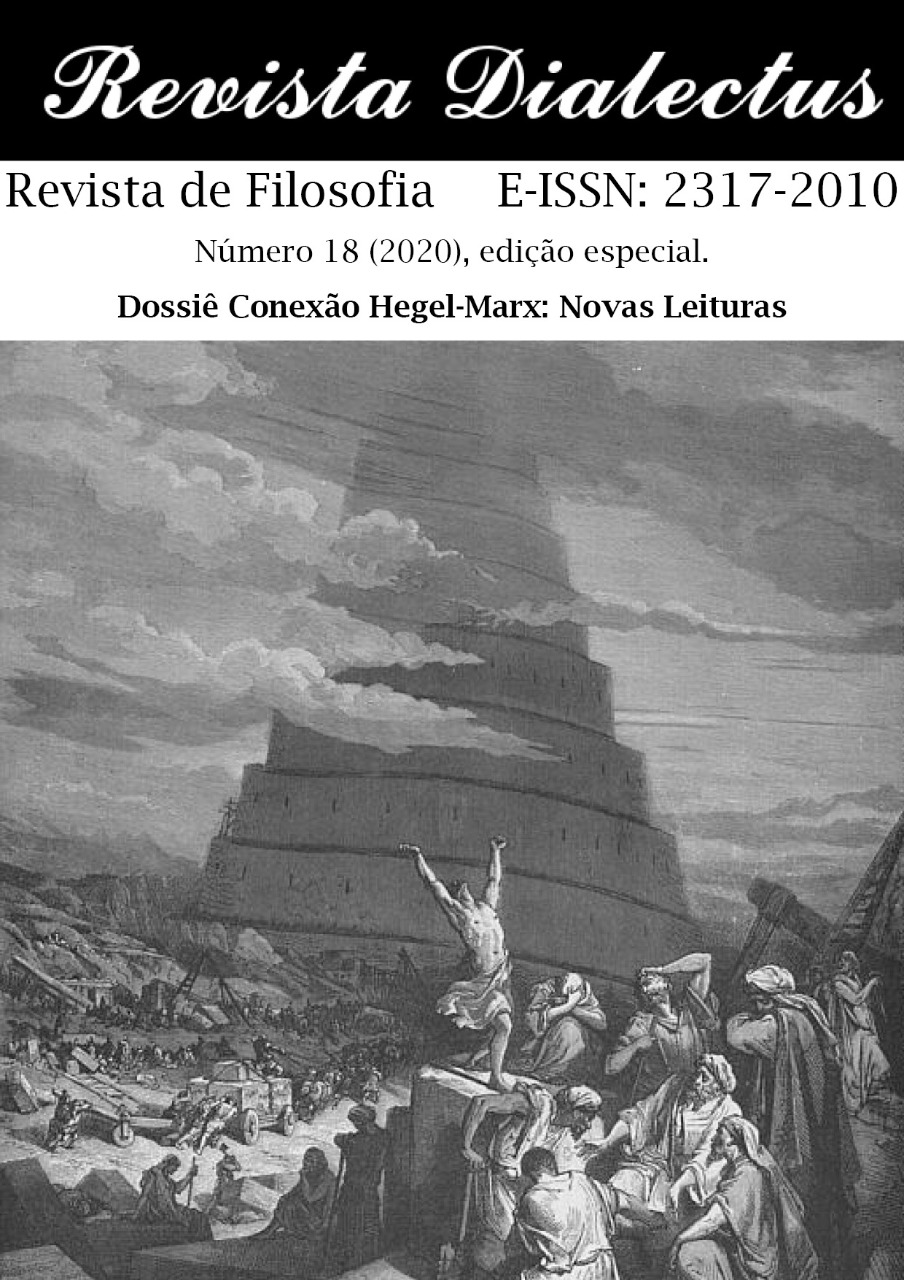A PLEBE E A SUA CONSTITUIÇÃO: O QUE HEGEL E MARX TÊM A NOS DIZER SOBRE O POPULISMO?
DOI:
https://doi.org/10.30611/2020n18id61191Keywords:
Plebe, Pobreza, Mercado capitalista, Representação políticaAbstract
Nos últimos anos, a crítica à dinâmica de mercado capitalista e a questão da pobreza ganharam um espaço dentro dos estudos hegelianos. No debate público, assistimos hoje em dia a uma crescente preocupação com o fenôme-no do populismo. O objetivo do meu artigo é encontrar elementos para uma caracterização do novo populismo a partir da consideração de Hegel sobre a plebe. De acordo com Hegel, a geração da plebe é o resultado da dinâ-mica antagônica da economia de mercado liberalizada. A passagem da sociedade civil burguesa ao Estado se apoia na base precária da formação da disposição de ânimo política a favor do Estado. Esta provém do bem-estar particular legalmente reconhecido e realizado como direito através da dupla mediação do político entre as insti-tuições sociais e a representação política. A plebe assinala uma perturbação dessa dinâmica de reconhecimento, pois ela não está organizada nos círculos particulares das instituições da sociedade civil. Isso traz consequências negativas para o estado de direito: por um lado, a atuação do governo não pode ser controlada de baixo para cima e, por outro, a plebe desenvolve uma disposição de ânimo contra o governo e as instituições do estado de direito.
References
__________. Zum Philosophischen Arbeitsbegriff: Hegel, Marx & Co. In: KODALLE, K.-M. (Org.). Arbeit und Lebenssinn. Eine aktuelle Herausforderung in historischer und systematischer Perspektive. Würzburg: Königshausen & Neumann, 2001. (Kritisches Jahrbuch der Philosophie Beiheft 3/2001), p. 99–108.
CASTEL, R. Les métamorphoses de la question sociale: Une chronique du salariat. Paris: Fayard, 1995.
DARDOT, P.; LAVAL, C. Ce cauchemar qui n’en finit pas. Comment le néolibéralisme défait la démocratie. Paris: La Découverte, 2016.
ELBE, I. Die postmoderne Querfront. Anmerkungen zu Chantal Mouffes Theorie des Politischen. In: Zeitschrift für Ideologiekritik, Heft 12/2018, p. 107–127.
__________. Politische Macht, Faschismus und Ideologie. Ernesto Laclaus Auseinandersetzung mit Nicos Poulantzas. In: Rote-Ruhr-Uni. Disponível em: http://www.rote-ruhr-uni.com/cms/IMG/pdf/poulantzas_und_laclau_langtext.pdf. Acesso em: 28/11/2019.
FUKUYAMA, F. The demand for dignity and the politics of resentments. New York: Macmillan, 2018. (iBook Edition).
HABERMAS, J. Im Sog der Technokratie. Berlin: Suhrkamp, 2013.
HEGEL, G. W. F. Grundlinien der Philosophie des Rechts oder Naturrecht und Staatswissenschaft im Grundrisse. GW 14,1. Hamburg: Meiner, 2009.
__________. Vorlesungsmanuskripte II (1816–1831). GW 18. Hamburg: Meiner, 1995.
__________. Enzyklopädie der philosophischen Wissenschaften im Grundrisse (1830). GW 20. Hamburg: Meiner, 1992.
__________. Vorlesungen über die Philosophie des subjektiven Geistes. Nachschriften zu den Kollegien der Jahre 1822 und 1825. GW 25,1. Hamburg: Meiner, 2008.
__________. Vorlesungen über die Philosophie der Weltgeschichte. Nachschriften zu dem Kolleg des Wintersemesters 1822/23. GW 27,1. Hamburg: Meiner, 2015.
HERZOG, L. Inventing the Market: Smith, Hegel and Political Theory. Oxford: Oxford University Press, 2013.
__________. Duas maneiras de “domar” o mercado: por que Hegel precisa da polícia e das corporações. In: Revista Eletrônica Estudos Hegelianos, ano 16, n. 28, 2019, p. 23–42.
JAEGGI, R. Was ist Ideologiekritik? In: JAEGGI, R.; WESCHE, T. (Org.). Was ist Kritik? Frankfurt/M.: Suhrkamp, 2009, p. 266–295.
__________. Kritik von Lebensformen. Berlin: Suhrkamp, 2014.
JAESCHKE, W. Es ist ein Begriff der Freiheit in Religion und Staat. In: ARNDT, A.; IBER, C.; KRUCK, G. (Org.). Staat und Religion in Hegels Rechtsphilosophie. Berlin: Akademie, 2009, p. 9–22.
KERVEGAN, J.-F. L’Effectif et le Rationnel: Hegel et L‟esprit objectif. Paris: Vrin, 2007.
KOSELLECK, R. Preußen zwischen Reform und Revolution: Allgemeines Landrecht, Verwaltung und soziale Bewegung von 1791 bis 1848. München: Klett-Cotta, 1989.
LACLAU, E. La razón populista. Buenos Aires: FCE, 2005.
MARX, K. Publizistische Arbeiten. In: Karl Marx: Werke, Artikel, literarische Versuche bis März 1843. MEGA I,1. Berlin: Dietz, 1975, p. 93–366.
__________. Zur Kritik der Hegelschen Rechtsphilosophie. In: Karl Marx: Werke, Artikel, Entwürfe März 1843 bis 1844. MEGA I,2. Berlin: Dietz, 1982, p. 5–137.
__________. Zur Kritik der Hegelschen Rechtsphilosophie. Einleitung. In: Karl Marx: Werke, Artikel, Entwürfe März 1843 bis 1844. MEGA I,2. Berlin: Dietz, 1982, p. 170–183.
__________. Briefe aus den “Deutsch-Französischen Jahrbüchern”. In: Karl Marx: Werke, Artikel, Entwürfe März 1843 bis 1844. MEGA I,2. Berlin: Dietz Verlag, 1982. p. 469–489.
__________. Grundrisse der Kritik der politischen Ökonomie. Erster Teil. In: Karl Marx: Ökonomische Manuskripte 1857/58. MEGA II,1.1. Berlin: Dietz, 1976.
__________. Das Kapital. Kritik der politischen Ökonomie. Erster Band. Hamburg 1890. MEGA II,10. Berlin: Dietz, 1991.
MOUNK, Y. The people vs. democracy: why our freedom is in danger and how to save it. Cambridge; Massachusetts: Harvard University Press, 2018.
NEUHOUSER, F. Foundations of Hegel’s social theory: Actualizing Freedom. Cambridge; Massachusetts; London: Harvard University Press, 2000.
RUDA, F. Hegels Pöbel. Eine Untersuchung der “Grundlinien der Philosophie des Rechts”. Konstanz: Konstanz University Press, 2011.
SCHILDBACH, I. Armut als Unrecht. Zur Aktualität von Hegels Perspektive auf Selbstverwirklichung, Armut und Sozialstaat. Bielefeld: Transcript, 2018.
Downloads
Published
Issue
Section
License
Authors who publish in this journal agree to the following terms:
- Authors retain the copyright and grant the journal the right of first publication, with the work simultaneously licensed under the Attribution-NonCommercial-NoDerivatives 4.0 International (CC BY-NC-ND 4.0) License, which allows the non-commercial sharing of work, without modifications and with acknowledgment of authorship and initial publication in this journal.
- Authors are authorized to take additional contracts separately, for non-exclusive distribution of the version of the work published in this journal (eg publish in institutional repository or as a book chapter), with acknowledgment of authorship and initial publication in this journal.
- Authors are allowed and encouraged to publish and distribute their work online (eg in institutional repositories or on their personal page) at any point before or during the editorial process, as this can generate productive changes as well as increase the impact and citation of published work (See The Free Access Effect).



















